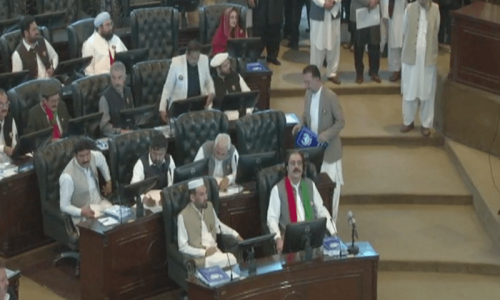PESHAWAR: Opposition members in the Khyber Pakhtunkhwa Assembly announced on Thursday that they would challenge Governor Ghulam Ali’s move to call the assembly’s session for the swearing-in of members in the court of law.
The assembly’s secretariat didn’t issue a notification for the sitting despite the issuance of the governor’s orders for it on Wednesday.
“We [the opposition] are going to the high court on Friday [against the governor’s orders to call the assembly],” Pakistan Peoples Party MPA Ahmad Kundi told Dawn.
Earlier in the day, the office of assembly Speaker Babar Saleem Swati formally sought the opinion of the law department about whether the governor’s order in question was in line with the Constitution.
Speaker seeks opinion of law dept about Ghulam Ali’s move
The speaker’s letter read, “A letter was received from the principal secretary to the governor [Ghulam Ali], where the governor ordered to summon the session on 22nd March for the taking of oaths of its members elected to reserved and minority seats notified by the Election Commission of Pakistan on 4th March, 2024.”
It added that the governor’s letter was handed over by Opposition Leader in the provincial assembly Dr Ibadullah to the secretary of the provincial assembly “in person instead of through a proper channel.”
The speaker’s office asked the law department whether Article 109 of the Constitution empowered the governor to call the assembly’s session on his own “even if it is read with the Constitution’s Articles 48(2) and 105(5) or is Article 109 substantially subject to Clause 1 of Article 105, adding whether the summoning of the assembly session is the discretion of the governor or it is subject to the advice of the cabinet or the chief minister.”
It also questioned the status of a case pending with the Peshawar High Court regarding the notification issued by the ECP on March 4, 2024, about reserved seats in the provincial assembly.
The speaker’s office asked the law department whether the letter of the governor about the assembly’s sitting without carrying the signatures of the required number of MPAs under Clauses 2 and 3 of the Constitution’s Article 54 read with Article 127 is legally and constitutionally correct.
“What if the summoning order in question is not in consonance with the Constitution’s mandate? Does the order still need to be notified in pursuance of Rule 3 of the provincial assembly of Khyber Pakhtunkhwa Procedure and Conduct of Business Rules, 1988?” read the communication of the speaker’s office.
The speaker’s office requested the law department to inform it about how to proceed in the matter or otherwise as required under Rule 3 of the Provincial Assembly of Khyber Pakhtunkhwa Procedure and Conduct of Business Rules, 1988.
“When the Assembly is summoned under Article 109 and Clause 7 of Article 130 or Clause 3 of Article 54 read with Article 127 of the Constitution, the secretary shall intimate to each member the date, time, and place fixed by the governor or the speaker, as the case may be, for the meeting of the assembly and shall cause a notification in respect thereof to be published in the gazette,” it said.
On Wednesday, Mr Ali called the provincial assembly’s sitting for Friday for the swearing-in of members who were elected to reserved and minority seats and notified by the Election Commission of Pakistan on March 4, according to an official document.
Mr Ali’s move to call a provincial assembly session caused a tiff with the newly-elected government, which called it unconstitutional.
“The governor can request the speaker of the provincial assembly to call a session but cannot call a sitting on his own. It is the discretion of the speaker to call the assembly and prepare its agenda,” said adviser to the chief minister on information and public relations Barrister Mohammad Ali Saif in a statement. It announced that it was in contact with its legal team about its response to the unconstitutional orders of the governor.
The Khyber Pakhtunkhwa Assembly has 30 reserved seats, including 26 for women and four for non-Muslims. The Sunni Ittehad Council, which has 90 PTI-backed members in the assembly, was denied its share of the reserved seats by the Election Commission of Pakistan. Those seats went to other parties that have presence in the house, including JUI-F, PML-N, PPPP, ANP, and PTI-Parliamentarians.
Published in Dawn, March 22nd, 2024














































Dear visitor, the comments section is undergoing an overhaul and will return soon.